
Zhou Enlai was a Chinese statesman, diplomat, and revolutionary who served as the first Premier of the People's Republic of China from September 1954 until his death in January 1976. Zhou served under Chairman Mao Zedong and aided the Communist Party in rising to power, later helping consolidate its control, form its foreign policy, and develop the Chinese economy.

The 1976 Tiananmen incident or the April 5 Tiananmen incident was a mass gathering and protest that took place on April 4–5, 1976, at Tiananmen Square in Beijing, China. The incident occurred on the traditional day of mourning, the Qingming Festival, after the Nanjing incident, and was triggered by the death of Premier Zhou Enlai earlier that year. Some people strongly disapproved of the removal of the displays of mourning, and began gathering in the Square to protest against the central authorities, then largely under the auspices of the Gang of Four, who ordered the Square to be cleared.
The Four Modernizations were goals formally announced by China's first Premier Zhou Enlai to strengthen the fields of agriculture, industry, defense, science, and technology in China. The Four Modernizations were adopted as a means of rejuvenating China's economy in 1977, following the death of Mao Zedong, and later were among the defining features of Deng Xiaoping's tenure as the paramount leader of China. At the beginning of "Reform and Opening-up", Deng further proposed the idea of "xiaokang" or "Moderately prosperous society" in 1979.
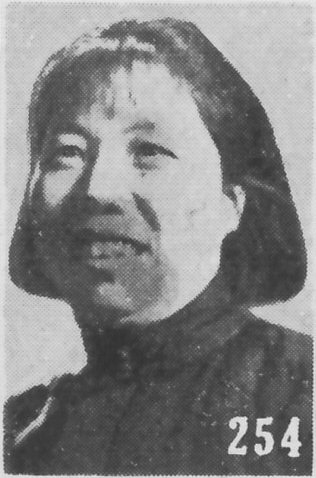
Deng Yingchao was the Chairwoman of the Chinese People's Political Consultative Conference from 1983 to 1988, a member of the Chinese Communist Party, and the wife of the first Chinese Premier, Zhou Enlai.
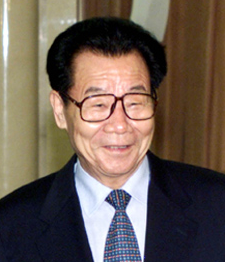
Li Ruihuan is a Chinese retired politician. Li was a member of the Politburo Standing Committee of the Chinese Communist Party (CCP), China's top decision-making body, between 1989 and 2002. Li served as Chairman of the 9th National Committee of the Chinese People's Political Consultative Conference (CPPCC) from 1993 to 2003; before that, he was the CCP secretary of Tianjin.
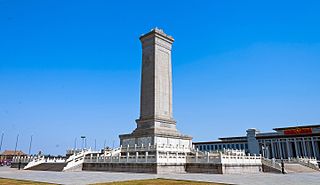
The Monument to the People's Heroes is a ten-story obelisk that was erected as a national monument of China to the martyrs of revolutionary struggle during the 19th and 20th centuries. It is located in the southern part of Tiananmen Square in Beijing, in front of the Mausoleum of Mao Zedong. The obelisk monument was built in accordance with a resolution of the First Plenary Session of the Chinese People's Political Consultative Conference (CPPCC) adopted on November 30, 1949, with construction lasting from August 1952 to May 1958. The architect of the monument was Liang Sicheng, with some elements designed by his wife, Lin Huiyin. The civil engineer, Chen Zhide (陈志德) was also instrumental in realizing the final product.

The Great Hall of the People is a state building located at the western edge of Tiananmen Square in Xicheng, Beijing. It is used for legislative and ceremonial activities by the government of the People's Republic of China and the ruling Chinese Communist Party. The People's Great Hall functions as the meeting place for the full sessions of the National People's Congress, the Chinese legislature, which occurs every year during March along with the national session of the Chinese People's Political Consultative Conference, a political advisory body. It is also the meeting place of the National Congress of the Chinese Communist Party, which, since the 12th conference in 1982, has occurred once every five years and the party's Central Committee which meets approximately once a year.

The Chairman Mao Memorial Hall, also known as the Mausoleum of Mao Zedong, is the final resting place of Mao Zedong, Chairman of the Politburo of the Chinese Communist Party from 1943 and the Chairman of the Chinese Communist Party from 1945 until his death in 1976.

Zhang Wentian was a Chinese politician who was a high-ranking leader of the Chinese Communist Party (CCP).

Li Min, original name Mao Jiaojiao, is a former Chinese politician who was the daughter of Mao Zedong and his third wife, He Zizhen. Her surname is Li rather than Mao, because Mao had changed his name to "Li Desheng" for a period of time to prevent himself from being chased by the Kuomintang army during the Chinese Civil War.
The Chinese People's Association for Friendship with Foreign Countries (CPAFFC) is one of the major foreign affairs organizations of the People's Republic of China. The organization is officially termed a "people's organization" and manages China's sister city relationships. Its stated aim is to promote friendship and mutual understanding between the Chinese people and foreign nations but observers have pointed out that it functions as a front organization in the united front system used to influence and co-opt elites to promote the interests of the Chinese Communist Party (CCP) while downplaying its association with the CCP.
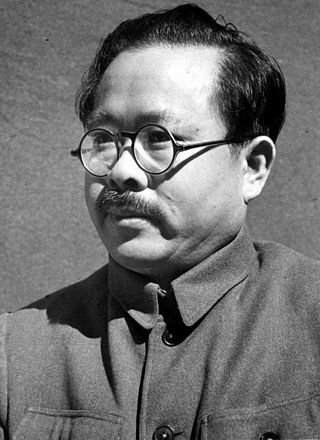
Ren Bishi was a military and political leader in the early Chinese Communist Party (CCP).

Lu Xun Academy of Fine Arts, or LAFA, is an art school in Shenyang, Liaoning Province, China.

Zhoudengji'nianguan station, is a station of Line 3 of the Tianjin Metro. It started operations on 1 October 2012.
Two Bombs, One Satellite was a nuclear weapon, intercontinental ballistic missile (ICBM), and artificial satellite development program by the People's Republic of China. China detonated its first fission and first thermonuclear weapons in 1964 and 1967 respectively, combined a nuclear weapon with a surface-to-surface missile in 1966, and successfully launched its first satellite in 1970.
Huang Mulan was a secret agent for the Chinese Communist Party (CCP). She was also known as Huang Zhangding and Huang Shuyi.
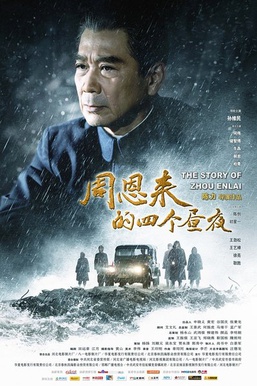
The Story of Zhou Enlai is a 2013 Chinese Historical drama film written by Tian Yunzhang and Jiang Yue and directed by Chen Li. Based on the life of Premier Zhou Enlai between May 3 and May 7, 1961, when he investigated extensively and scientifically the rural situation in Huaxi of Guiyang and the old revolutionary base Boyan Township of Hebei, it stars Sun Weimin as Zhou Enlai and Hao Yan as Zhou's wife Deng Yingchao, with He Wei, Bai Qing, Chu Zhibo, and Niu Ben. The film premiered in China on 16 July 2013.
Events from the year 1963 in China.
Lhasa Martyrs' Mausoleum, or Lhasa Martyrs' Cemetery, is located next to No.4 Jinnong Lane, Jinzhu Middle Road, Lhasa, Tibet Autonomous Region, China. The mausoleum was built in 1955 and was remodeled in 1991.














